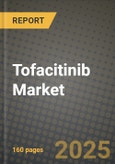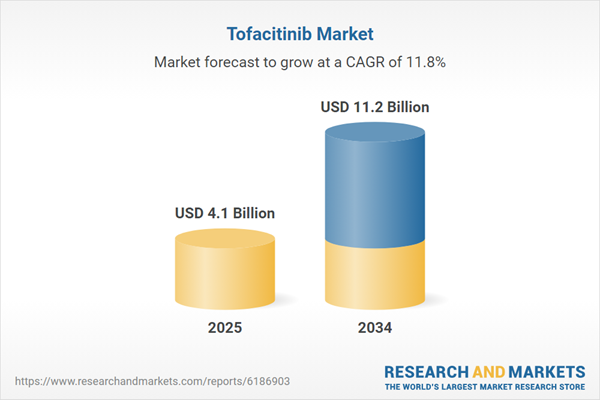The Tofacitinib Market represents a dynamic segment within the broader immunology and rheumatology therapeutics landscape. Tofacitinib, an oral Janus kinase (JAK) inhibitor, is approved for the treatment of various autoimmune conditions including rheumatoid arthritis, psoriatic arthritis, ulcerative colitis, and ankylosing spondylitis. Its ability to modulate the immune response by inhibiting intracellular signaling pathways has made it a popular alternative to biologic therapies, particularly for patients who prefer oral medications over injections or infusions. The drug’s market appeal lies in its efficacy, rapid onset of action, and growing real-world data supporting long-term use. While branded versions continue to dominate in developed markets, the rise of generics and biosimilars is beginning to shape competitive dynamics in price-sensitive regions.
The tofacitinib market experienced important developments that influenced its positioning and uptake. Regulatory bodies across North America and Europe updated safety warnings due to cardiovascular and malignancy risks associated with long-term JAK inhibitor use. As a result, prescribers exercised greater caution in patient selection, favoring those with limited biologic options. However, the drug maintained its stronghold in ulcerative colitis treatment, supported by positive real-world evidence and updates in clinical guidelines. Emerging market penetration improved as generic versions became available, expanding access and affordability. Pharmaceutical companies focused on differentiating their formulations with extended-release variants and patient-friendly packaging. Simultaneously, digital adherence tools and education campaigns were launched to improve compliance and disease monitoring among patients using JAK inhibitors like tofacitinib.
The tofacitinib market is expected to be shaped by evolving risk-benefit evaluations, expanded indications, and innovation in treatment management. Ongoing studies assessing the drug’s use in dermatologic and other inflammatory diseases could broaden its therapeutic footprint. Regulatory oversight will continue to influence market dynamics, pushing companies to invest in post-marketing surveillance and comparative safety studies. Artificial intelligence and personalized medicine will play a larger role in helping physicians identify ideal patient profiles for tofacitinib, thereby optimizing outcomes while mitigating adverse effects. As generic competition intensifies, pricing strategies and access programs will become critical differentiators. However, the lingering safety concerns will remain a key hurdle for wider acceptance and require proactive data transparency and clinician engagement to address long-term use viability.
Key Insights: Tofacitinib Market
- Expansion of real-world studies is strengthening clinical confidence in tofacitinib for ulcerative colitis and other autoimmune conditions.
- Generic versions entering emerging markets are driving down costs and increasing accessibility among broader patient populations.
- Digital adherence tools and app-based tracking solutions are supporting long-term medication compliance in chronic treatment regimens.
- Pharmaceutical firms are developing once-daily or extended-release formulations to enhance patient convenience and therapeutic adherence.
- Growing focus on patient stratification using biomarker-driven approaches is reshaping treatment personalization in JAK inhibitor therapy.
- Rising global prevalence of autoimmune diseases, especially inflammatory bowel disease and arthritis, is sustaining demand for targeted therapies like tofacitinib.
- Patient preference for oral therapies over biologic injectables is boosting the popularity of JAK inhibitors in chronic disease management.
- Expanding clinical guidelines supporting tofacitinib’s use in ulcerative colitis are driving increased physician adoption and prescription volumes.
- Strong performance in health economics and quality of life metrics is positioning tofacitinib favorably in payer and formulary evaluations.
- The main challenge for the tofacitinib market remains safety-related concerns, particularly regarding cardiovascular and malignancy risks, which continue to limit broader physician confidence and necessitate ongoing surveillance, regulatory warnings, and careful patient selection protocols.
Tofacitinib Market Segmentation
By Drug Class
- Antirheumatic
- Janus Kinase Inhibitor
- Immunosuppressant
By Strength
- 5mg
- 10mg
- 11mg
- 22mg
By Route Of Administration
- Oral
- Other Routes Of Administration
By Distribution Channel
- Hospital Pharmacy
- Retail Pharmacy
- Online Pharmacy
By Application
- Ulcerative Colitis
- Rheumatoid Arthritis
- Psoriasis
- Other Applications
Key Companies Analysed
- Pfizer Inc. (Xeljanz)
- Teva Pharmaceutical Industries Ltd.
- Dr. Reddy’s Laboratories Ltd.
- Cipla Limited
- Aurobindo Pharma Limited
- Zydus Lifesciences Limited
- Hetero Labs Limited
- Sun Pharmaceutical Industries Ltd.
- Mylan N.V. (Viatris Inc.)
- Lupin Limited
Tofacitinib Market Analytics
The report employs rigorous tools, including Porter’s Five Forces, value chain mapping, and scenario-based modeling, to assess supply-demand dynamics. Cross-sector influences from parent, derived, and substitute markets are evaluated to identify risks and opportunities. Trade and pricing analytics provide an up-to-date view of international flows, including leading exporters, importers, and regional price trends.Macroeconomic indicators, policy frameworks such as carbon pricing and energy security strategies, and evolving consumer behavior are considered in forecasting scenarios. Recent deal flows, partnerships, and technology innovations are incorporated to assess their impact on future market performance.
Tofacitinib Market Competitive Intelligence
The competitive landscape is mapped through proprietary frameworks, profiling leading companies with details on business models, product portfolios, financial performance, and strategic initiatives. Key developments such as mergers & acquisitions, technology collaborations, investment inflows, and regional expansions are analyzed for their competitive impact. The report also identifies emerging players and innovative startups contributing to market disruption.Regional insights highlight the most promising investment destinations, regulatory landscapes, and evolving partnerships across energy and industrial corridors.
Countries Covered
- North America - Tofacitinib market data and outlook to 2034
- United States
- Canada
- Mexico
- Europe - Tofacitinib market data and outlook to 2034
- Germany
- United Kingdom
- France
- Italy
- Spain
- BeNeLux
- Russia
- Sweden
- Asia-Pacific - Tofacitinib market data and outlook to 2034
- China
- Japan
- India
- South Korea
- Australia
- Indonesia
- Malaysia
- Vietnam
- Middle East and Africa - Tofacitinib market data and outlook to 2034
- Saudi Arabia
- South Africa
- Iran
- UAE
- Egypt
- South and Central America - Tofacitinib market data and outlook to 2034
- Brazil
- Argentina
- Chile
- Peru
Research Methodology
This study combines primary inputs from industry experts across the Tofacitinib value chain with secondary data from associations, government publications, trade databases, and company disclosures. Proprietary modeling techniques, including data triangulation, statistical correlation, and scenario planning, are applied to deliver reliable market sizing and forecasting.Key Questions Addressed
- What is the current and forecast market size of the Tofacitinib industry at global, regional, and country levels?
- Which types, applications, and technologies present the highest growth potential?
- How are supply chains adapting to geopolitical and economic shocks?
- What role do policy frameworks, trade flows, and sustainability targets play in shaping demand?
- Who are the leading players, and how are their strategies evolving in the face of global uncertainty?
- Which regional “hotspots” and customer segments will outpace the market, and what go-to-market and partnership models best support entry and expansion?
- Where are the most investable opportunities - across technology roadmaps, sustainability-linked innovation, and M&A - and what is the best segment to invest over the next 3-5 years?
Your Key Takeaways from the Tofacitinib Market Report
- Global Tofacitinib market size and growth projections (CAGR), 2024-2034
- Impact of Russia-Ukraine, Israel-Palestine, and Hamas conflicts on Tofacitinib trade, costs, and supply chains
- Tofacitinib market size, share, and outlook across 5 regions and 27 countries, 2023-2034
- Tofacitinib market size, CAGR, and market share of key products, applications, and end-user verticals, 2023-2034
- Short- and long-term Tofacitinib market trends, drivers, restraints, and opportunities
- Porter’s Five Forces analysis, technological developments, and Tofacitinib supply chain analysis
- Tofacitinib trade analysis, Tofacitinib market price analysis, and Tofacitinib supply/demand dynamics
- Profiles of 5 leading companies - overview, key strategies, financials, and products
- Latest Tofacitinib market news and developments
Additional Support
With the purchase of this report, you will receive:- An updated PDF report and an MS Excel data workbook containing all market tables and figures for easy analysis.
- 7-day post-sale analyst support for clarifications and in-scope supplementary data, ensuring the deliverable aligns precisely with your requirements.
- Complimentary report update to incorporate the latest available data and the impact of recent market developments.
This product will be delivered within 1-3 business days.
Table of Contents
Companies Mentioned
- Pfizer Inc. (Xeljanz)
- Teva Pharmaceutical Industries Ltd.
- Dr. Reddy’s Laboratories Ltd.
- Cipla Limited
- Aurobindo Pharma Limited
- Zydus Lifesciences Limited
- Hetero Labs Limited
- Sun Pharmaceutical Industries Ltd.
- Mylan N.V. (Viatris Inc.)
- Lupin Limited
Table Information
| Report Attribute | Details |
|---|---|
| No. of Pages | 160 |
| Published | October 2025 |
| Forecast Period | 2025 - 2034 |
| Estimated Market Value ( USD | $ 4.1 Billion |
| Forecasted Market Value ( USD | $ 11.2 Billion |
| Compound Annual Growth Rate | 11.8% |
| Regions Covered | Global |
| No. of Companies Mentioned | 10 |









